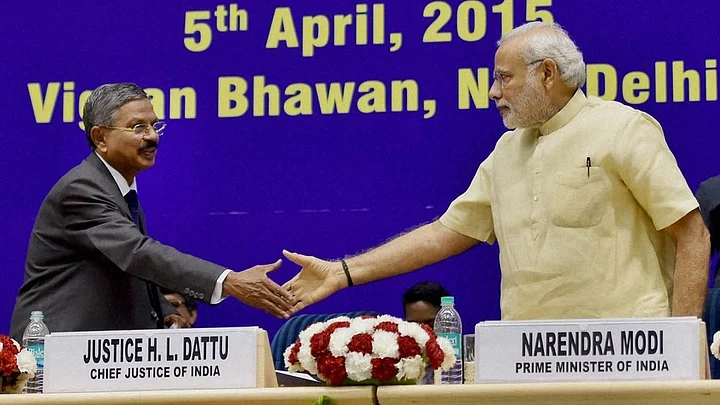The ongoing face-off between the judiciary and the executive over the operationalisation of the National Judicial Appointment Commission has exposed the former as a cabal of judges fighting a bitter battle to safeguard its turf by clinging on to the non-transparent collegium system.
Chief justice of India H L Dattu has refused to take part in proceedings of the NJAC, which was designed after consultations with the higher judiciary when the Judicial Appointments Commission Bill, 2014, was introduced and discussed in Parliament before its passage earlier this year. This and other subsequent actions and observations of some of Justice Dattu’s brother judges reveal that an unaccountable judiciary has thumbed its nose at both the executive and the legislature.
A five-judge Constitution Bench headed by Justice J S Khehar has taken a clear stand in favour of the clubby, non-transparent collegium system that was buried once the NJAC came into being. The plea taken by the Bench is that NJAC poses a threat to the independence of the judiciary. Nothing can be far from the truth.
The main flaw with the Bench’s position is that judicial independence is not an end in itself; it is but a means to an end. It is indisputable that judicial independence concerns the judiciary’s freedom from improper control, external influence or interference from powerful political forces in the adjudication of cases.
More importantly, judicial independence is about governance and management of judiciary’s affairs. Reports over the past ten years or so suggest that the judiciary, both the lower and the higher, has been less than effective in stemming the rot that has afflicted it.
When judges speak of judicial independence as if it is an end in itself, or if it’s unlimited or intended merely for individual or collective benefit rather than for the benefit of justice seekers and litigants, they risk creating the impression that they regard themselves as being above the law or not accountable for their performance than other government officials are for theirs. Like the executive and the legislature, the judiciary is an organ of government.
The judiciary is therefore a co-equal branch of government. It is neither lesser nor more superior than the other two. So, judicial independence does not excuse the judges of the Supreme Court or the high courts from compliance with full accountability. All it does is to merely define the appropriate standards of accountability by which judges should be judged.
India’s higher judiciary has become preoccupied with its perception that its so-called independence has come under threat from external quarters. But it refuses to fully accept accountability of the performance of judges. The judiciary must examine its own performance honestly and with integrity and demonstrate the courage and ability to improve its record when it is found to be insufficient.
In a sense, the judiciary has failed itself. By not taking the lead to reform the lower judiciary, the men in black robes in the hallowed portals of the Supreme Court often fail to serve to the general satisfaction of litigants and the public whom they serve.
The clubby arrangement of the collegium system was based on an over-reliance on elevating senior members of the bar to the bench at the cost of those who belong to the judicial services in the states. Members of the bar are less insulated from external influences, which are at the root of the corruption within the judiciary.
While there is a dire shortage of judges in the high courts and district courts, the Supreme Court has done little to fill up those vacancies. The total vacancies across all high courts is 378; the Supreme Court has three. Surely, the public have a right to know what steps the Supreme Court and the Ministry of Law and Justice have taken to fill up these vacancies and the consequent piling up of more than 31 million cases across all courts.
One of the more basic but important reforms, arguably, is the creation of a national judicial service on the lines of the Indian Administrative Service and Indian Police Service with its own codes of conduct and service rules and regulations. The issue of an all-Indian judicial service (AIJS) has been discussed and debated in the past, but shelved on the consideration that it will erode the powers of the state. If the AIJS is created on the same lines as the IAS and IPS, with judicial officers, allocated to the states, where is the question of erosion of powers of the states?
Part of being master of your own house is to keep your house in order. If the judiciary cannot demonstrate its own ability to do a good job on all fronts and manage its affairs, how can it expect the public or other branches of government to defer to its independence? The system of checks and balances in a democracy essentially strikes a balance with the judiciary. In consideration of the judiciary’s relative independence, the other organs of governments expect it to do its job well. If the judiciary cannot or does not – it has not so far – do so, it is not in any credible position to complain about the inevitable intrusion on its independence.
